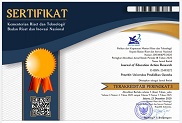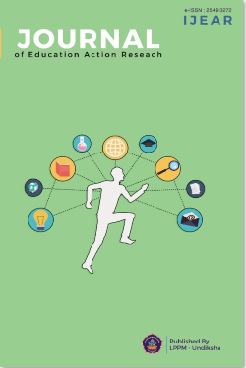How Leadership Failures Fuel Covetousness and Corruption in Nigeria's Educational System?
DOI:
https://doi.org/10.23887/jear.v7i3.67444Keywords:
Leadership Failures, Covetousness, Corruption, Educational SystemAbstract
The importance of integrity is undermined in communities where corruption is pervasive and the respect for authority figures is diminished. This research paper aims to analyze how leadership failures contribute to covetousness and corruption within Nigeria's educational system. The study analyzes the impact of ineffective leadership on the prevalence of unethical practices, such as bribery, embezzlement and favoritism. Data sources included academic literature, reports and official documents. Then data is analysis and extracted from selected literature. Through an analysis of relevant literature and case studies, the research highlights the detrimental consequences of these corrupt practices on the quality of education and the overall development of the country. In conclusion, strengthening legal and regulatory frameworks, enhancing oversight mechanisms, investing in capacity building and promoting a culture of integrity are key recommendations that can help pave the way for a more transparent, accountable and effective educational system. By implementing these recommendations, Nigeria can ensure that its educational institutions are led by individuals who prioritize the well-being and future of the nation's students.
References
Abdullahi, N. J. K. (2018). Corruption in education system and management of primary schools in Nigeria. https://doi.org/10.22452/MOJEM.VOL6NO1.2. DOI: https://doi.org/10.22452/mojem.vol6no1.2
Absalyamova, S., Absalyamov, T., Khusnullova, A., & Mukhametgalieva, C. (2016). The impact of corruption on the sustainable development of human capital. In Journal of Physics: Conference Series, 738(1), 012009. https://doi.org/10.1088/1742-6596/738/1/012009. DOI: https://doi.org/10.1088/1742-6596/738/1/012009
Adebakin, M. A., Aderinto, A. A., & Oyekunle, M. O. (2018). Perception of Examination Malpractices among Secondary School Students in Nigeria. Journal of Research in Education and Society, 9(1), 133–144. https://eduzonejournal.com/index.php/eiprmj/article/view/47.
Aja, N. S. (2020). Educational leadership for social change: Positioning school administrators as agents of social change in Nigeria. Management in Education. https://doi.org/10.1177/0892020620909966. DOI: https://doi.org/10.1177/0892020620909966
Akinniyi, A. J., Erinsakin, O. A., & Emma-Ayire, S. O. (2021). Corruption in the Nigerian education sector: Causes and remedies. KIU Interdisciplinary Journal of Humanities and Social Sciences, 2(2), 1–13. https://kijhus.kiu.ac.ug/assets/articles/1631085133_corruption-in-the-nigerian-education-sector-causes-and-remedies.pdf. DOI: https://doi.org/10.59568/KIJHUS-2021-2-2-01
Arhipova, O., Kokina, I., & Michaelsson, A. R. (2021). School Principal’s Management Competences For Successful School Development. Tiltai, 79(1). https://doi.org/10.15181/tbb.v78i1.1757. DOI: https://doi.org/10.15181/tbb.v78i1.1757
Asaju, K., Arome, S., & Mukaila, I. (2014). Leadership crisis in Nigeria: The urgent need for moral education and value re-orientation. Public Administration Research, 3(1), 117. https://doi.org/10.5539/par.v3n1p117. DOI: https://doi.org/10.5539/par.v3n1p117
Asiyai, R. I. (2015). School Administrators Strategies for Combating Corruption in Universities in Nigeria. Journal of Education and Learning, 4(4), 160–167. https://doi.org/10.1080/13603124.2019.1710569. DOI: https://doi.org/10.5539/jel.v4n4p160
Barnes, L. L., & Spangenburg, J. M. (2018). When Leadership Fails--A View from the Lens of Four Employees. American Journal of Business Education, 11(3), 49–54. https://eric.ed.gov/?id=EJ1185098. DOI: https://doi.org/10.19030/ajbe.v11i3.10188
Chidi, E. N., & Chidolue, D. N. (2017). Democratic Principles and Political Leadership in Nigeria: Problems and Prospects. Social Science Research Network. https://doi.org/10.2139/SSRN.3080442. DOI: https://doi.org/10.2139/ssrn.3080442
Dewantara, J. A., Hermawan, Y., Yunus, D., Prasetiyo, W. H., Efriani, E., Arifiyanti, F., & Nurgiansah, T. H. (2021). Anti-corruption education as an effort to form students with character humanist and law-compliant. Jurnal Civics: Media Kajian Kewarganegaraan, 18(1), 70–81. https://doi.org/10.21831/jc.v18i1.38432. DOI: https://doi.org/10.21831/jc.v18i1.38432
Dridi, M. (2014). Corruption and education: Empirical evidence. International Journal of Economics and Financial Issues, 4(3), 476–493. https://dergipark.org.tr/en/pub/ijefi/issue/31963/352018.
Durotoluwa, A. B., & Olaniran, B. H. (2019). Corruption in Nigerian Education: Perception, Profiles and Strategies for Control. Higher Education for the Future, 6(1), 117–141. https://www.sciencedirect.com/science/article/pii/S0963996921000491.
Eja, K. M., & Ramegowda, M. (2020). Government project failure in developing countries: a review with particular reference to Nigeria. Global Journal of Social Sciences, 19, 35–47. https://doi.org/10.4314/gjss.v19i1.4. DOI: https://doi.org/10.4314/gjss.v19i1.4
Gümüş, S., Arar, K., & Oplatka, I. (2021). Review of international research on school leadership for social justice, equity and diversity. Journal of Educational Administration and History, 53(1), 81–99. https://doi.org/10.1080/00220620.2020.1862767. DOI: https://doi.org/10.1080/00220620.2020.1862767
Iacono, T., Keeffe, M., Kenny, A., & McKinstry, C. (2019). A Document Review of Exclusionary Practices in the Context of Australian School Education Policy. Journal of Policy and Practice in Intellectual Disabilities, 16(4), 264–272. https://doi.org/10.1111/jppi.12290. DOI: https://doi.org/10.1111/jppi.12290
Iheduru, O. C. (2016). Leadership, Critical Thinking and Social Cohesion in Nigeria. Social Science Research Network. https://papers.ssrn.com/sol3/papers.cfm?abstract_id=2726800.
Ikegbu, E. A., Iwuchukwu, G. C. S., Aloysius, E. S., & Ariche, C. K. (2020). Poverty of leadership, coronavirus and sustainable development in Nigeria. European Journal of Sustainable Development. https://doi.org/10.14207/ejsd.2020.v9n4p351. DOI: https://doi.org/10.14207/ejsd.2020.v9n4p351
Jacob, O. N., & Garba, A. D. (2021). Shortage of Academic Staff in the Higher Institution of Learning in Nigeria. Central Asian Journal of Social Sciences and History, 2(3), 108–124. https://www.sciencedirect.com/science/article/pii/S0963996921000491.
Kamara, S. S., & Dadhabai, S. (2022). Assessment Factors Influencing Students’ Academic Achievement. Journal of Management Information & Decision Sciences, 25(1), 1–13. https://search.ebscohost.com/login.aspx?direct=true&profile=ehost&scope=site&authtype=crawler&jrnl=15247252&AN=154576612&h=ate4EgdNeUzun3NoY3nNY0tEgVjhF6fm3v0HYb3vIlcWV6K3eWLgp48qK6Q1WS2PyhfKlS%2B1milUG7TfVCwZSQ%3D%3D&crl=c.
Kim, J. (Sunny), Milliman, J. F., & Lucas, A. F. (2021). Effects of CSR on affective organizational commitment via organizational justice and organization-based self-esteem. International Journal of Hospitality Management, 92(September 2020), 102691. https://doi.org/10.1016/j.ijhm.2020.102691. DOI: https://doi.org/10.1016/j.ijhm.2020.102691
Kure, K. U. (2020). Leadership, corruption and the dignity of humans: Some reflections from the Nigerian context. Hts Teologiese Studies-theological Studies. https://doi.org/10.4102/HTS.V76I2.5873. DOI: https://doi.org/10.4102/hts.v76i2.5873
Mabeko-Tali, M. (2018). Governance and Corruption in Nigeria’s Higher Education: The Perspective of Academics. International Journal of Educational Development, 62, 88–95. https://onlinelibrary.wiley.com/doi/pdf/10.1002/9781444308600#page=123.
Mahfouz, J. (2020). Principals and stress: Few coping strategies for abundant stressors. Educational Management Administration and Leadership, 48(3), 440–458. https://doi.org/10.1177/1741143218817562. DOI: https://doi.org/10.1177/1741143218817562
Nwadiani, M., & Omodafe, O. (2021). Corruption and the Nigerian Educational System: A Critical Analysis of Causes, Effects, and Strategies for Eradication. Education Sciences, 11(4), 159. https://www.scirp.org/html/7-7202485_101621.htm.
Ochulor, C. L. (2011). Failure of leadership in Nigeria. American Journal of Social and Management Sciences, 2(3), 265–271. https://doi.org/10.5251/ajsms.2011.2.3.265.271. DOI: https://doi.org/10.5251/ajsms.2011.2.3.265.271
Ogunmilade, A., Nwoko, G. C., & Akhigbe, O. J. (2017). The Challenge of Leadership and Governance in Nigeria. Research on Humanities and Social Sciences, 7(14), 47–53. https://cajssh.centralasianstudies.org/index.php/CAJSSH/article/view/283.
Okeke-Uzodike, U., & Nneji, C. (2017). The Politics of Education Reforms in Nigeria: Contending Issues and Way Forward. University of Toronto Press.
Okolie, U. C., & Igbini, M. D. (2020). Leadership failure and acute youth unemployment in Nigeria. RUDN Journal of Public Administration, 7(3), 254–271. https://doi.org/10.22363/2312-8313-2020-7-3-254-271. DOI: https://doi.org/10.22363/2312-8313-2020-7-3-254-271
Okwudishu, C. (2017). Leadership Styles and Teacher Effectiveness in Nigerian Secondary Schools. Journal of Educational Leadership, Policy and Practice, 32(2), 44–55. https://journal.escetjerps.com/index.php/escjerps/article/download/95/95.
Oluwadayisi, A. L. (2018). Ethics and Moral Education in Nigeria: Challenges and Remedies. African Journal of Teacher Education, 7(1), 16–23. https://link.springer.com/chapter/10.1007/978-3-031-13814-0_11.
Onifade, C. O., & Shorunke, A. A. (2015). Corruption in the Nigerian Education Sector: Causes, Consequences and the Way Forward. Journal of Education and Practice, 6(13), 110–117. https://www.tandfonline.com/doi/abs/10.1080/02188791.2022.2122022.
Onyishi, A. (2018). Corruption in Nigeria’s Educational System: A Review. In B. L. Mbatia (Ed.), Leadership and Educational Governance in Africa: A Focus on Nigeria (pp. 207–231). Springer. https://api.taylorfrancis.com/content/books/mono/download?identifierName=doi&identifierValue=10.4324/9781315627564&type=googlepdf.
Ordu, U. B.-A. (2021). The Role of Teaching and Learning Aids/Methods in a Changing World. Bulgarian Comparative Education Society, 9, 210–216. https://eric.ed.gov/?id=ED613989.
Purwanto, A., Bernarto, I., Absari, M., Wijayanti, L. M., & Hyun, C. C. (2020). The Impacts Of Leadership And Culture On Work Performance In Service Company And Innovative Work Behavior As Mediating Effects. Journal of Reseacrh in Business, Economics, and Education, 2(1), 216–227. https://www.neliti.com/publications/322932/the-impacts-of-leadership-and-culture-on-work-performance-in-service-company-and.
Rosenzweig, E. D., Roth, A. V, & Dean, J. W. (2003). The Influence of an Integration Strategy on Competitive Capabilities and Business Performance: An Exploratory Study of Consumer Products Manufacturers. Journal of Operations Management, 21(4), 437–456. https://doi.org/10.1016/S0272-6963(03)00037-8. DOI: https://doi.org/10.1016/S0272-6963(03)00037-8
Sarmini, Made Swanda, I., & Nadiroh, U. (2018). The importance of anti corruption education teaching materials for the young generation. Journal of Physics: Conference Series, 953(1). https://doi.org/10.1088/1742-6596/953/1/012167. DOI: https://doi.org/10.1088/1742-6596/953/1/012167
Seregig, I. K., Suryanto, T., Hartono, & Rivai, E. (2018). Preventing the Acts of Corruption through Legal Community Education. Journal of Social Studies Education Research, 9(2), 138–159. https://dergipark.org.tr/en/pub/jsser/issue/37944/438288.
Singh, B. (2019). Character Education in the 21st Century. Journal of Social Studies (JSS), 15(1), 1–12. https://doi.org/10.21831/jss.v15i1.25226. DOI: https://doi.org/10.21831/jss.v15i1.25226
Suleiman, Y. (2021). Integrating Technopreneurship Education in Nigerian Universities: Strategy for Decreasing Youth Unemployment. Journal of Education and Research, 11(1), 49–76. https://doi.org/10.51474/jer.v11i1.501. DOI: https://doi.org/10.51474/jer.v11i1.501
Urama, E. N. (2020). Corruption and the leadership question in Nwabueze’s A Parliament of Vultures and Ogbeche’s Harvest of Corruption. The Journal of English Language and Literature. https://doi.org/10.17722/JELL.V13I1.426. DOI: https://doi.org/10.17722/jell.v13i1.426
Wanabuliandari, S., Ardianti, S. D., Gunarhadi, G., & Rejekiningsih, T. (2021). Study Analysis of Confidence Level on Slow Learner Students. International Journal of Elementary Education, 5(4), 584. https://doi.org/10.23887/ijee.v5i4.39971. DOI: https://doi.org/10.23887/ijee.v5i4.39971
Wenibowei, K. M. (2017). Bad leadership and institutional failure: foundation of corruption in Nigeria. Journal of Research in National Development. https://doi.org/10.4314/JORIND.V15I1.
Downloads
Published
How to Cite
Issue
Section
License
Copyright (c) 2023 Moses Adeleke Adeoye, Rasheedat Modupe Oladimeji, Olaolu Paul Akinnubi

This work is licensed under a Creative Commons Attribution-ShareAlike 4.0 International License.











